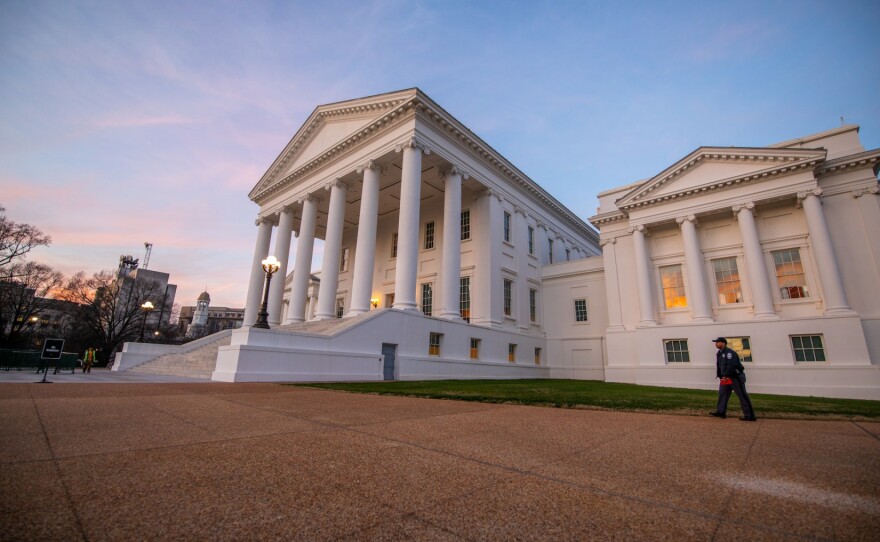Virginia lawmakers rejected legislation this week that would have placed limits on corporate political donations and several other campaign finance proposals.
Their actions mean Virginia will remain one of five states with no restrictions on corporate contributions. Gov. Ralph Northam will likely leave office making relatively minor changes to a system that he called a “boondoggle that alienates its citizens and makes them lose faith in government” as a candidate in 2017.
Democrats in the House of Delegates are asking for patience. Del. Marcus Simon (D-Fairfax) told a House subcommittee on Thursday that he and others had planned to take up the issue after last year’s regular session, only to see the pandemic and this summer’s racial justice protests change their legislative focus.
Campaign finance reforms could now be taken up by a proposed comprehensive campaign finance study making its way through the House. Simon suggested the proposal had the support of senior Democrats in that chamber.
“It’s a real concrete study,” Simon told the committee. “It’s not another opportunity to kick the can down the road.”
Former Gov. Doug Wilder convened a commission focused on campaign finance and ethics in the early 1990s. Nearly thirty years later, many of of its recommendations, including contribution limits and random auditing of reports, have not been implemented.
Lawmakers on a House panel unanimously agreed to advance one proposal from Simon: a ban on using campaign money for personal expenses. The bill includes an exemption for childcare on the campaign trail.
Virginia politicians have used campaign funds for everything from steak dinners to beauty salons. Loose reporting requirements mean its hard to discern whether a hotel stay constitutes a legitimate travel expense or a family getaway. The commonwealth is the only state that currently allows unlimited personal use of campaign dollars, according to the campaign finance reform group American Promise.
Del. Mark Sickles (D-Fairfax) said the change was necessary even though he doubted lawmakers were exploiting the current rules.
“I just wish we’d have passed this years ago,” Sickles said.
Campaign finance reform advocates pushed for more.
“This should be only considered a down-payment on campaign finance reform that we’re waiting for after waiting for 30 years,” said Nancy Morgan, chair of the Virginia chapter of American Promise.
Advocates of Virginia's current system say it is more transparent than elsewhere. But lax campaign finance rules were one reason for Virginia’s low ranking on a recent ethics index. The no-limits rules also apply to regulated public utilities like Dominion Energy.
Two bills would have effectively banned contributions from Dominion and Appalachian Power. A Senate bill from Sen. Chap Petersen (D-Fairfax) targeted public utilities, while another from Del. Ibraheem Samirah (D-Fairfax) would have prohibited donations to all so-called public service corporations, including broadband providers.
Advocates argued that the companies are distinct from other corporate donors because their profit structure is so closely tied to actions in the General Assembly. In particular, critics of Dominion say its generous political giving has pushed lawmakers to carve out favorable rate structures that made the company hundreds of millions of dollars that would have otherwise gone back to its customers.
But Chris Nolen, an attorney at McGuireWoods who represents Dominion, told the committee that the company shouldn’t be singled out.
“There are all manner of interests that come before this General Assembly on tax policy, environmental policy, franchise laws that all have business before you, and they are not included in this,” Nolen said of Samirah’s bill.
Nolen’s case won the day as two Democrats voted alongside two Republicans to table the bill. They also declined to vote on a bill from Del. Lee Carter (D-Prince William) banning all corporate contributions.
“There is a lot of appetite for reform -- a lot of appetite for reform -- but also a strong notion that it has to be comprehensive,” Sickles said.
Petersen’s bill, meanwhile, failed by the exact same 5-10 tally that it got last year.
Nine of the ten senators who rejected the bill accepted Dominion contributions totalling $155,000 in 2020, according to data from the Virginia Public Access Project. About half of that total went to a single lawmaker: Sen. Lionell Spruill (D-Chesapeake). All but one of the five senators who supported Petersen’s bill have accepted donations from Clean Virginia, a group that offers financial backing to lawmakers who refuse Dominion’s cash.
The same Senate committee also rejected another bill from Petersen that would have capped personal campaign contributions.



